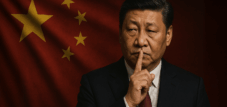Stability instead of chaos: Why the world needs a strong leader – and who that could be.
### World Wars and Chaos: Are We Heading Forth Towards Catastrophe? This 9-Year-Old Analysis Is Frighteningly Relevant ### Forget Multipolarity: A Provocative Text Explains Why Only a Superpower Can Truly Create Peace ### The Great Illusion: Why the Dream of a Just World Order Could Lead to New Wars ### Hegemony as a Savior?
A controversial theory about the state of the world, fact-checked: What speaks for it and what against it.
In light of the wars in Ukraine and the Middle East, growing tensions in the Indo-Pacific region, and a general increase in global instability, the world seems to be falling apart. Many observers speak of a new multipolar world order in which several power centers, such as the US, China, Russia, and India, vie for influence. But what if this idea is not the solution, but rather the cause of the problem?
Political scientist Matthias Kennert provided an almost frighteningly prophetic analysis in his 2015 working paper.
Published by the Federal Academy for Security Policy (BAKS Working Paper 5/2015). Its provocative core thesis: Multipolarity is not a stable state, but a highly dangerous transitional phase that inevitably leads to crises and conflicts. True stability, according to Kennert, is historically not created by a balance of many powers, but by the dominance of a single hegemonic power.
This radical perspective turns the desire for a “fairer” world order on its head. But how much truth is there in this theory when applied to today's fragile global situation? We examine Kennert's theses and analyze what holds true in light of current events, where his argumentation is convincing, and where it might fall short or require critical examination.
Suitable for:
Analysis of the article on multipolarity and hegemony in the context of the current world situation
Agreements with current research: Multipolarity as a phase of instability
Matthias Kennert's article correctly identifies a key characteristic of the current world situation: Multipolarity is indeed associated with increased instability and vulnerability to crises. This assessment is confirmed by current data:
- In 2024, international organizations recorded over 170,700 deaths due to armed conflict, with forecasts of over 230,000 by the end of 2024.
- Nine active wars were registered in 2023 (Ukraine, Gaza, Sudan, Myanmar, Burkina Faso, Nigeria, Somalia, Ethiopia, Syria)
- More than 122 million people are currently fleeing war and violence.
Hegemonic transformation as a recognizable pattern
The thesis of a hegemonic transition is confirmed by current research. The 2025 Peace Report confirms “fundamental power shifts in the international community,” while current analyses show that China systematically seeks to undermine US hegemony without itself aiming for global dominance.
Historical parallels at the beginning of the 20th century
Kennert's comparison with the situation around 1900 is analytically accurate. Then as now, similar factors characterize the world situation:
- Rise of new powers (then Germany/USA, today China/India)
- Decline of the established hegemon (Great Britain/USA)
- Close economic interdependence coupled with political competition
Hub for security and defense - advice and information
The hub for security and defense offers well-founded advice and current information in order to effectively support companies and organizations in strengthening their role in European security and defense policy. In close connection to the SME Connect working group, he promotes small and medium -sized companies (SMEs) in particular that want to further expand their innovative strength and competitiveness in the field of defense. As a central point of contact, the hub creates a decisive bridge between SME and European defense strategy.
Suitable for:
Between Hegemony and Multipolarity: The Fragile Power Balance of the Present
Critical objections and weaknesses
Simplified representation of the G20
Kennert's characterization of the G20 as "weak on security policy issues" is put into perspective by current data: The G20 countries are responsible for 82% of global military spending and possess 98% of all nuclear warheads. This suggests that the G20 does indeed have security policy relevance, even if it does not act as a collective hegemon.
One-sided evaluation of multipolar institutions
The article underestimates the complexity of new multipolar structures. For example, the BRICS countries expanded from five to eleven members in 2024 and are developing alternative economic structures to “de-dollarize” South-South trade. These developments demonstrate that multipolar systems can indeed develop institutional stability.
Incomplete analysis of NATO hegemony
While Kennert cites NATO as an example of a successful hegemonic order, current developments reveal significant tensions within the alliance. The Strategic Concept of 2022 had to respond to massive threats, and Europe is increasingly developing “security policy autonomy” independent of the US.
Suitable for:
Assessment in the context of the current fragile world situation
Accurate crisis diagnosis
Kennert's analysis of the current instability is confirmed by recent events:
- Ukraine war: In 2024, Russia largely dictated the course of the war and made maximalist demands for peace negotiations.
- Middle East conflicts: The Gaza war cost over 53,000 people their lives.
- Systemic threats: Authoritarian states like Russia and China are increasingly forming an “authoritarian alliance”
Problematic normative implications
However, the article reveals a problematic preference for hegemonic orders. The realistic theories of international relations on which Kennert bases his work are increasingly being questioned. Alternative approaches emphasize:
- Multilateralism as a modern form of sovereignty rather than a threat
- Institutionalism as a practical middle ground between realism and idealism
- Democratic peace as an alternative to hegemonic stability
Unconsidered factors of the present
Kennert's analysis neglects crucial characteristics of the current crisis:
- Climate change as a systemic threat: The combination of rearmament and the climate crisis is leading to a “more dangerous situation than at the height of the Cold War”
- Technological disruption: Through “Made in China 2025”, China is pursuing a systematic technological transformation that is changing traditional concepts of power.
- New forms of warfare: Cyber warfare, disinformation, and hybrid threats require different stability mechanisms than classical hegemonic orders.
Matthias Kennert's article offers a fundamentally accurate analysis of the current instability and correctly identifies the characteristics of a hegemonic transformation phase. His historical parallels and diagnosis of multipolar instability are confirmed by current data.
However, the one-sided preference for hegemonic orders neglects both the problems of historical hegemonies and the potential of new multipolar institutions. The current world situation is more complex than the binary scheme of "hegemony vs. multipolarity" suggests.
The fragile global situation of 2024/25 confirms Kennert's diagnosis of instability, but refutes his normative conclusion: Instead of a return to the hegemonic order, innovative institutional arrangements are needed that take into account both the realities of multipolar power distribution and the requirements of global cooperation in the face of climate change, pandemics and other cross-border challenges.
Advice - planning - implementation
I would be happy to serve as your personal advisor.
Head of Business Development
Chairman SME Connect Defense Working Group
Advice - planning - implementation
I would be happy to serve as your personal advisor.
contact me under Wolfenstein ∂ Xpert.digital
call me under +49 89 674 804 (Munich)


